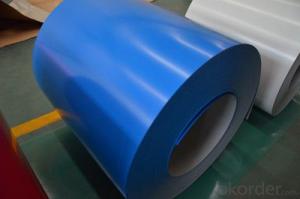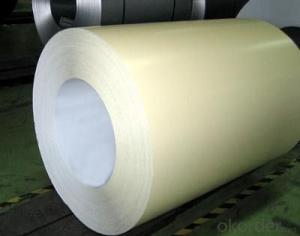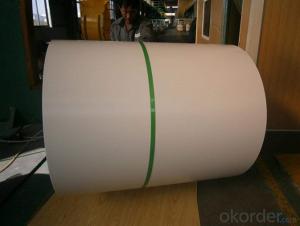Prepainted rolled steel Coil for Construction Roofing use
- Loading Port:
- Shanghai
- Payment Terms:
- TT OR LC
- Min Order Qty:
- 50 m.t.
- Supply Capability:
- 30000 m.t./month
OKorder Service Pledge
OKorder Financial Service
You Might Also Like
Structure of Prepainted Rolled steel Coil for Construction Roofing
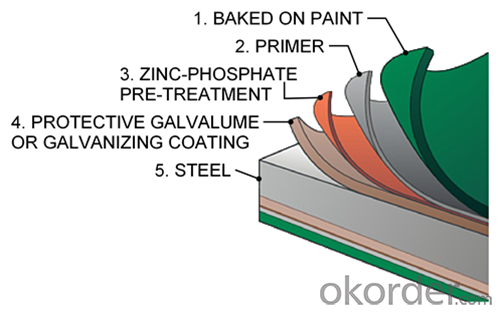
Description of Prepainted Rolled steel Coil for Construction Roofing
Prepainted Rolled steel Coil is a kind of coated steel coil/sheet. With the cold rolled steel of different strength and thickness as substrate, it is produced through applying Al-Zn coat on both faces by hot dip process. In its coating, Al accounts for about 55%, Si 1.6%, while the remaining is Zn. Aluminum zinc coils enjoys both the physical protective feature and durability of Al and the electrochemical protective property of Zn. And its surface has bright silver color and regular embossed-like figure, which are highly decorative.
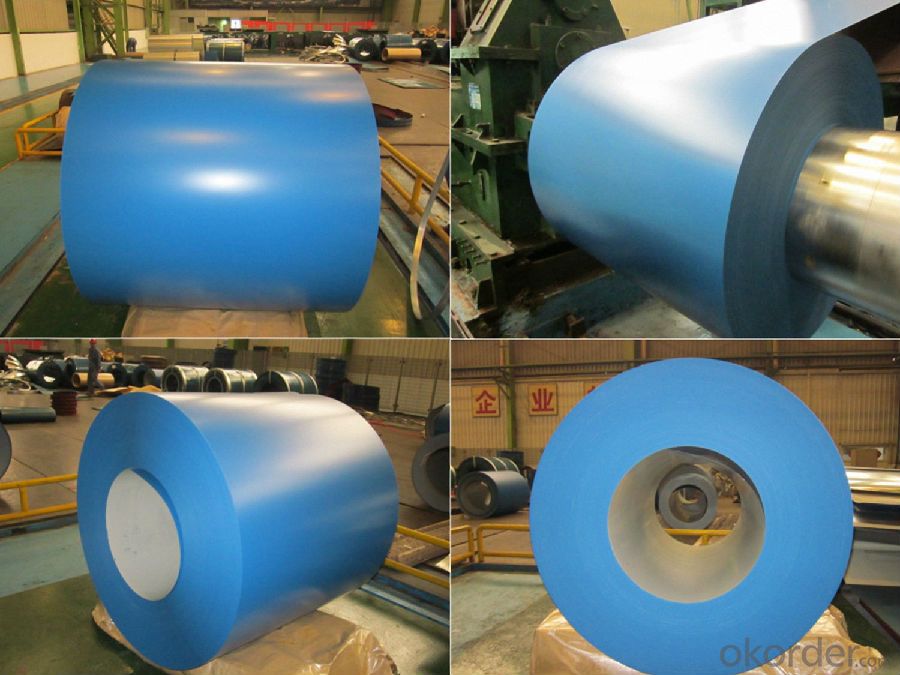
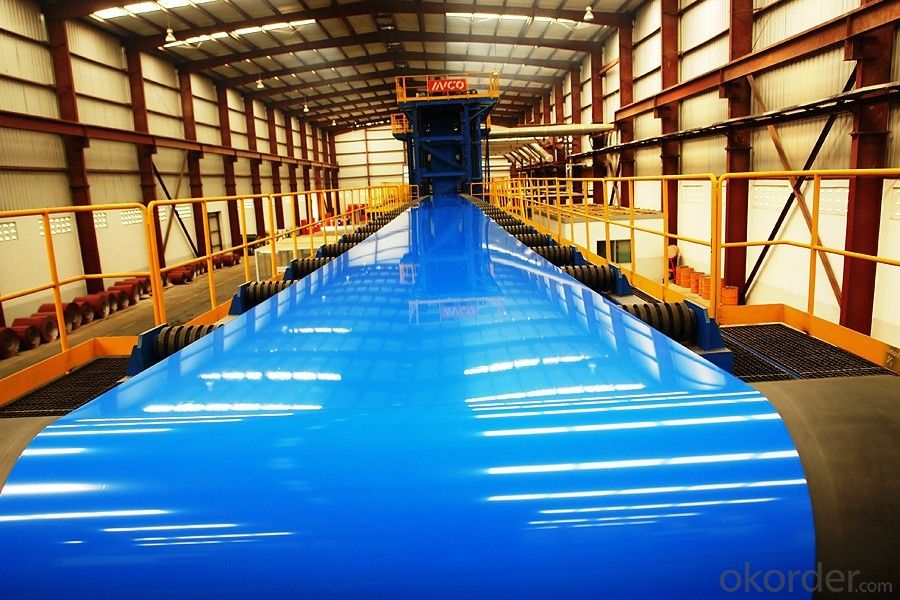
Main Feature of Prepainted Rolled steel Coil for Construction Roofing
1.Corrosion resistance: It mainly depends on the aluminum protection. When the zinc being worn, the aluminum will form a dense layer of aluminum oxide, resist corrosion material to prevent further corrosion inside.
2. Heat resistance: Aluminum zinc alloy steel sheet has excellent heat resistance, can withstand high temperatures over 300 centigrade, and is similar with aluminized steel high temperature oxidation resistance. It often used in chimney pipes, ovens, fluorescent lighting device and the device cover.
3. Heat reflective: Galvanized steel plate heat-reflective high rate is twice as galvanized steel, often used to make insulation materials.
4. Economy: Because density of 55% AL-Zn is smaller than the density of Zn, so in the same weight and thickness of Galvanized zinc layer, aluminum-zinc steel plate is larger area more than 3% of galvanized steel sheet.
Applications of Prepainted Rolled steel Coil for Construction Roofing
1. Construction and building: roofing; ventilating duct; handrail; partition panel;etc.
2. Electric appliance: refrigerator; washing machine; refrigerator; DVD;etc.
3.Transportation: oil tank; road sign; etc.
4.Agriculture:barn; etc.
5.Others:vending machine; game machine; etc.
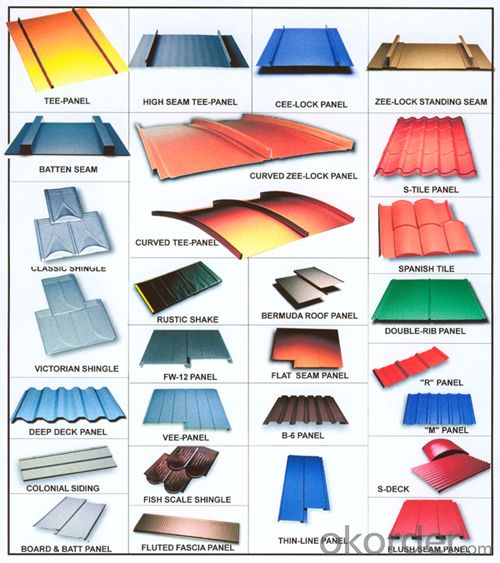
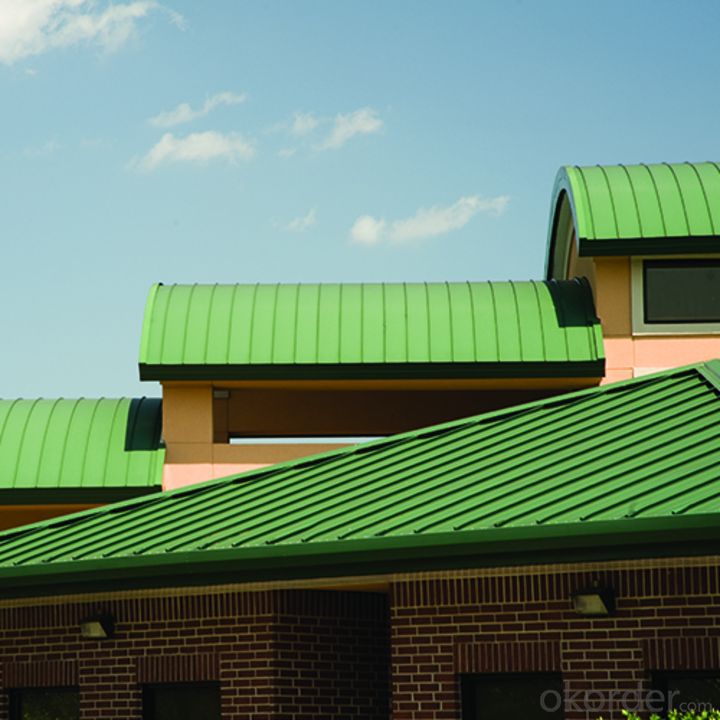
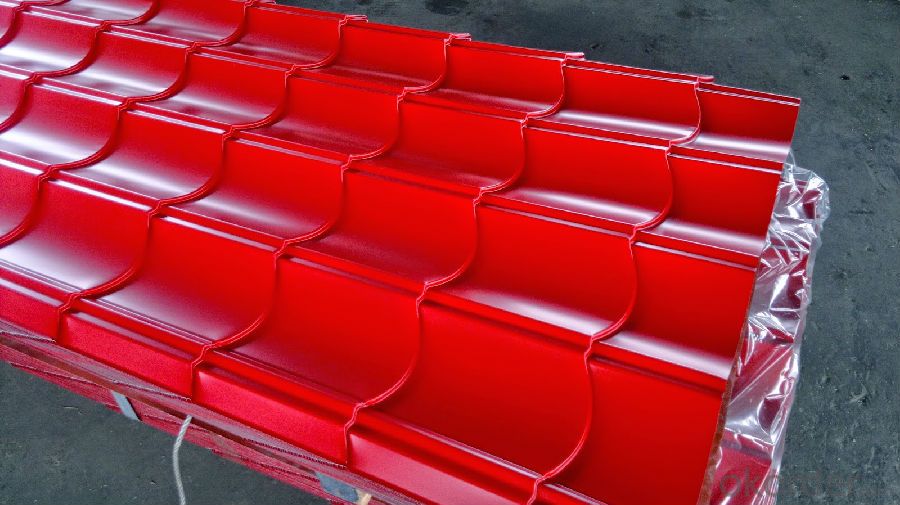
Specifications of Rolled steel Coil for Construction Roofing
Product | Prepainted Rolled steel Coil for Construction Roofing |
Material Grade | SGCC / SGCH / DX51D+AZ, etc |
Thickness | 0.2-3.0mm |
Width | 600-1500mm |
Tolerance | Thickness: +/-0.02mm , Width:+/-2mm |
Zinc-coating | AZ40-150g/m2 |
Technique | Raw material: Hot rolled steel coil --> Cold rolled_>hot dipped galvalume |
Surface | Dried, Chromated, Unoiled |
Spangle | Regular spangle , small spangle, zero spangle |
ID | 508MM |
Coil weight | 10MT max |
Export package | Cardboard inner sleeves, Waterproof paper, galvanized steel covered and steel strip packed |
FAQ of Prepainted Rolled steel Coil for Construction Roofing
We have organized several common questions for our clients,may help you sincerely:
1. What is the minimum order quantity ?
Our MOQ is 50mt for each size. And we will consider to give more discount if you make big order like 1000 tons and more. Further more, the more appropriate payment term your offer the better price we can provide.
2. How long can we receive the product after purchase?
Usually within thirty working days after receiving buyer’s advance payment or LC. We will arrange the factory manufacturing as soon as possible. The cargo readiness usually takes 15-25 days, but the shipment will depend on the vessel situation.
3. How to guarantee the quality of the products?
We have established the international advanced quality management system,every link from raw material to final product we have strict quality test;We resolutely put an end to unqualified products flowing into the market. At the same time, we will provide necessary follow-up service assurance.
- Q:I'm a hiker and cook on a camp fire with a canteen cup. So which would be a better material for cooking on a campfire with, aluminum or stainless steel?
- Direct fire will kind of ruin stainless steel. I've screwed up several stainless steel pans cooking directly on a campfire. I have to agree with wildflower the best route by far in a small cast iron pan. They are pretty heavy though.
- Q:How are steel coils used in the manufacturing of automotive exhaust systems?
- Steel coils are used in the manufacturing of automotive exhaust systems as the primary material for producing pipes and tubing. These coils are processed and formed into various shapes and sizes to create the necessary components, such as the main exhaust pipe and smaller sections for mufflers and catalytic converters. The steel's strength and durability make it an ideal choice for withstanding the high temperatures and corrosive nature of exhaust gases, ensuring the longevity and functionality of the system.
- Q:How are steel coils used in the production of steel drums?
- Steel coils are used in the production of steel drums by being unwound and shaped into circular sheets. These sheets are then formed into the body of the drum, providing the necessary strength and durability.
- Q:What are the different types of steel alloys used in coils?
- Coils commonly employ various types of steel alloys, each possessing unique properties and characteristics. Some frequently used types include: 1. Carbon Steel: As the most fundamental and widely utilized steel alloy in coils, it boasts low carbon content and renowned strength and durability. Carbon steel coils find extensive application in areas demanding high strength, such as automotive parts, construction materials, and machinery components. 2. Stainless Steel: Comprising an iron, chromium, and other element alloy, stainless steel coils exhibit exceptional resistance to corrosion, formidable strength, and heat resistance properties. They are typically employed in scenarios where shielding against corrosion and staining is pivotal, such as kitchen appliances, medical equipment, and transportation components. 3. Galvanized Steel: Galvanized steel coils are formed by coating regular carbon steel with a layer of zinc, furnishing excellent corrosion resistance and safeguarding the underlying steel from rust. Commonly utilized in outdoor settings like roofing, fencing, and automotive body parts. 4. Alloy Steel: Alloy steel coils are manufactured by incorporating diverse alloying elements like manganese, nickel, chromium, or molybdenum into carbon steel, thereby enhancing the steel's strength, hardness, and wear resistance. These coils frequently find application in industries necessitating high strength and toughness, such as machinery, tools, and construction equipment manufacturing. 5. Electrical Steel: Electrically specialized steel coils are designed explicitly for employment in electrical equipment like transformers and electric motors. These coils possess low electrical resistance and high magnetic permeability, facilitating efficient electricity conduction and magnetic field generation. Typically constructed from a silicon alloy, which enhances electrical and magnetic properties. In conclusion, the selection of a steel alloy for coils hinges upon the specific requirements of the given application, encompassing factors like strength, corrosion resistance, electrical conductivity, and heat resistance.
- Q:What are the uses of galvanized steel coils?
- Due to their unique properties, galvanized steel coils find extensive usage in diverse industries. The following are some prevalent applications of galvanized steel coils: 1. Construction: Galvanized steel coils are extensively employed in the construction sector for various purposes. They are utilized in the production of roofing sheets, wall panels, and structural components. The galvanized coating safeguards the steel from corrosion, thus increasing its lifespan and ensuring durability even in harsh weather conditions. 2. Automotive industry: The automotive industry relies on galvanized steel coils for the production of different parts and components. These coils are instrumental in manufacturing body panels, chassis, and other structural elements of vehicles. The galvanized coating provides exceptional resistance against corrosion, a vital factor for automobile longevity. 3. Appliances: Galvanized steel coils are employed in the manufacturing process of diverse household appliances, including refrigerators, washing machines, and air conditioners. These coils are used to fabricate the outer panels and cabinets of these appliances, offering them a robust and durable structure. 4. Agriculture: Galvanized steel coils also find applications in the agricultural sector. They are utilized in the production of agricultural equipment, such as grain storage silos, irrigation systems, and livestock enclosures. The galvanized coating protects the steel from rust and corrosion, ensuring the safety and longevity of these agricultural structures. 5. Industrial applications: Galvanized steel coils are widely employed in multiple industrial applications. They are utilized in the manufacturing of ductwork, ventilation systems, and industrial piping. The galvanized coating aids in resisting chemicals, moisture, and other environmental factors, making it an ideal choice for industrial environments. 6. Electrical industry: The electrical industry relies on galvanized steel coils for the production of electrical enclosures, conduit pipes, and cable trays. The galvanized coating offers excellent protection against corrosion, ensuring the safety and durability of electrical installations. 7. Furniture manufacturing: Galvanized steel coils are utilized in the furniture manufacturing industry for the production of furniture frames, shelves, and cabinets. The galvanized coating enhances the strength and durability of these furniture pieces, making them long-lasting and resistant to corrosion. In conclusion, galvanized steel coils are extensively used in various industries due to their exceptional resistance to corrosion, durability, and strength. They represent a cost-effective and dependable choice for applications that require protection against rust and environmental factors.
- Q:What are the potential dangers of handling steel coils?
- There are several potential dangers associated with handling steel coils. Firstly, steel coils are heavy and can pose a risk of physical injury if not handled properly. The weight of the coils can cause strains, sprains, or even more serious injuries if dropped or mishandled. This is particularly true when using manual lifting equipment or when attempting to move the coils without proper training or assistance. Secondly, steel coils often have sharp edges or protruding parts that can cause cuts or puncture wounds if not handled with care. These sharp edges can be especially hazardous when attempting to manipulate or position the coils during transportation or storage. It is important to wear appropriate personal protective equipment, such as gloves, to minimize the risk of injury. In addition, steel coils can become unstable if not adequately secured or balanced. Improper stacking or storage of the coils can lead to them shifting or falling, potentially causing serious injuries or damage. It is crucial to follow proper stacking and storage procedures, including using appropriate equipment and supports, to ensure stability and prevent accidents. Furthermore, steel coils are often stored in areas with limited space or uneven surfaces, increasing the risk of trips, falls, or collisions. It is essential to maintain clear and well-organized storage areas, free of obstacles or hazards, to reduce the likelihood of accidents. Lastly, steel coils can be subject to corrosion or rust, which can weaken the metal and compromise their structural integrity. This can increase the risk of the coils collapsing or breaking during handling, potentially causing injuries or damage to property. Regular inspections and maintenance of the coils, as well as proper storage in dry and well-ventilated areas, can help mitigate this risk. Overall, the potential dangers of handling steel coils include physical injuries from their weight and sharp edges, instability during transportation or storage, accidents due to limited space or uneven surfaces, and the risk of structural failure due to corrosion or rust. It is crucial to follow proper safety protocols, receive appropriate training, and use the necessary equipment to minimize these risks and ensure safe handling of steel coils.
- Q:Nickel is ferro magnetic in nature. But when it is added with stainless steel, it makes stainless steel non-magnetic. What is the structural changes happened with the presence of nickel?
- All stainless steel is non magnetic.
- Q:I completed the missions in broken steel like: the one of the rangers, the one of vault 101, the one of the enclave, and several others.are there any more INTERESTING missions?
- I purely have been given it, and that i had carried out all the missions. i all started at a save element interior the midst of the sport so i ought to nonetheless redo some tiers and it pops up and tells you that the point cap has been raised. you nonetheless can do all the outdated missions no prob. in spite of in case you all started a sparkling character and went with the aid of them lower back you would be waiting to get to point 30 and then proceed on after the unique ending.
- Q:How do steel coils contribute to the construction sector?
- Steel coils play a crucial role in the construction sector in various ways. Firstly, steel coils are extensively used in the manufacturing of structural components such as beams, columns, and trusses. These components form the backbone of buildings and provide the necessary strength and stability to the structure. Steel coils are processed and shaped into these structural components, ensuring that they can withstand the heavy loads and forces experienced in construction. Additionally, steel coils are utilized in the production of reinforcement bars, commonly known as rebars. These rebars are embedded within concrete structures, enhancing their tensile strength and preventing cracks or fractures. This reinforcement is essential in constructing durable and resilient infrastructure, from bridges and highways to buildings and stadiums. Moreover, steel coils find applications in the fabrication of roofing and cladding materials. The coils are processed and formed into corrugated sheets or panels, which are then used to cover roofs and walls. These steel roofing and cladding materials offer excellent protection against environmental factors such as rain, wind, and UV radiation. Furthermore, they provide thermal insulation, fire resistance, and aesthetic appeal to the constructed buildings. Furthermore, steel coils contribute to the construction sector through their use in the production of various mechanical components, including pipes, tubes, and fittings. These components are essential for plumbing, heating, ventilation, and air conditioning systems in buildings. Steel's durability, corrosion resistance, and ability to handle high-pressure conditions make it an ideal material for these applications. The versatility, strength, and durability of steel coils make them indispensable in the construction sector. They provide the necessary materials for constructing robust structures, reinforcing concrete, and producing essential components. Steel coils not only contribute to the safety and longevity of buildings but also play a vital role in the overall development and growth of the construction industry.
- Q:How are steel coils processed for heat treatment?
- Steel coils are typically processed for heat treatment by first being uncoiled and then cleaned to remove any dirt or scale. The coils are then heated to a specific temperature, which is determined based on the desired properties of the steel. This temperature is maintained for a specific period of time to allow for the desired transformation of the steel's microstructure. After the heat treatment process is complete, the coils are cooled either slowly or rapidly, depending on the desired properties. This allows the steel to be hardened or softened as required. Finally, the coils are recoiled and prepared for further processing or shipment.
1. Manufacturer Overview |
|
|---|---|
| Location | |
| Year Established | |
| Annual Output Value | |
| Main Markets | |
| Company Certifications | |
2. Manufacturer Certificates |
|
|---|---|
| a) Certification Name | |
| Range | |
| Reference | |
| Validity Period | |
3. Manufacturer Capability |
|
|---|---|
| a)Trade Capacity | |
| Nearest Port | |
| Export Percentage | |
| No.of Employees in Trade Department | |
| Language Spoken: | |
| b)Factory Information | |
| Factory Size: | |
| No. of Production Lines | |
| Contract Manufacturing | |
| Product Price Range | |
Send your message to us
Prepainted rolled steel Coil for Construction Roofing use
- Loading Port:
- Shanghai
- Payment Terms:
- TT OR LC
- Min Order Qty:
- 50 m.t.
- Supply Capability:
- 30000 m.t./month
OKorder Service Pledge
OKorder Financial Service
Similar products
New products
Hot products
Related keywords
